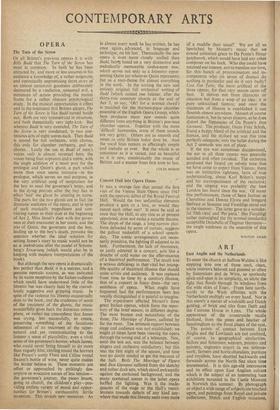Concert Hall into Opera House IT was a strange fate
that united the first visit of the Vienna State Opera since 1947 with the operatic debut of the Royal Festival Hall. Would the two unfamiliar elements produce a gain or a loss, or would they cancel each other out? It must be said at once that the Hall, at any rate as at present appointed, does not make a suitable theatre. The shape of the stage, a long narrow plat- form defended by acres of curtain, suggests the gallant makeshift of a school speech- day. The scenic arrangements are neces- sarily primitive, the lighting ill adapted to its task. Furthermore, the lack of resonance, so justly admired in a concert, acts like a douche of cold water on the effervescence of a theatrical performance. The result was a serious deficiency in that vital but intang- ible quality of theatrical illusion that should unite artists and audience. It was replaced from time to time by a contrary illusion, that of a concert in fancy dress—the very antithesis of opera. What might have happened had the performances been less vocally distinguished it is painful to imagine.
The experiment affected Mozart's three great Italian operas, which form the reper- tory of the brief season, in different degree. The most human and naturalistic of the three, The Marriage of Figaro, suffered by far the most. The intimate rapport between stage and audience was not established; we might at times have been viewing the opera through the wrong end of a telescope. Nor, until the last act, was the balance between singers and orchestra satisfactory; but this was the first night of the season, and time was no doubt needed to get the measure of the hall. Both The Marriage of Figaro and Don Giovanni suffered from the sketchy and rather drab sets, which stood awkwardly against the curtained background, and the many nocturnal scenes in the latter opera baffled the lighting. Was it the . inade- quacies of the stage or the Hall's merci- lessness towards defects of any kind any- where that made this libretto seem even more of a muddle than usual? We are all so bewitched by Mozart's music that we extend unlimited grace to Da Ponte's flimsy patchwork, which would have laid any other composer on his back. Who else could have retained our interest, not to mention our love, for this bunch of procrastinators and in- competents who (in terms of drama) do nothing in particular and do it very badly? Cosi Fan Tulle, the most artificial of the three operas, for that very reason came off best. It derives not from character or situation but from a wisp of an idea; it is pure unlocalised fantasy, and once the minimum of illusion is established it can flourish almost anywhere. Mozart of course humanises it, but he never distorts, as he does distort the flippancies of Da Ponte's Don Giovanni. The producer, Oscar Fritz Schuh, found a happy blend of the artificial and the human, and the stylised set was this time perfectly adequate; only the ballet during the Act 2 serenade was out of place.
If the eye was sometimes disappointed, the ear in all three operas was generally satisfied and often ravished. The orchestra produced that limpid yet velvety tone that we have come to expect from Vienna; there was an instinctive rightness, born of true understanding, about Karl Bohm's tempi and his accompaniment of the recitative; and the singing was probably the best London has heard since the war. Of many fine performances, those of Sena Jurinac as Cherubino and Donna Elvira and Irrngard Seefried as Susanna and Fiordiligi stand out in the memory. The latter gave us a wonder- ful 'Deh vieni' and 'Per pieta.' Her Fiordiligi rather outweighed the (by normal standards) acceptable Dorabella of Dagmar Hermann— the single weakness in the ensemble of this opera.
WINTON DEAN


































 Previous page
Previous page